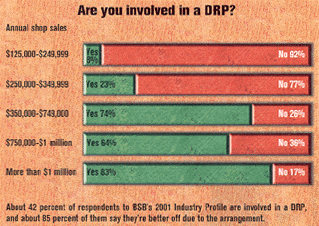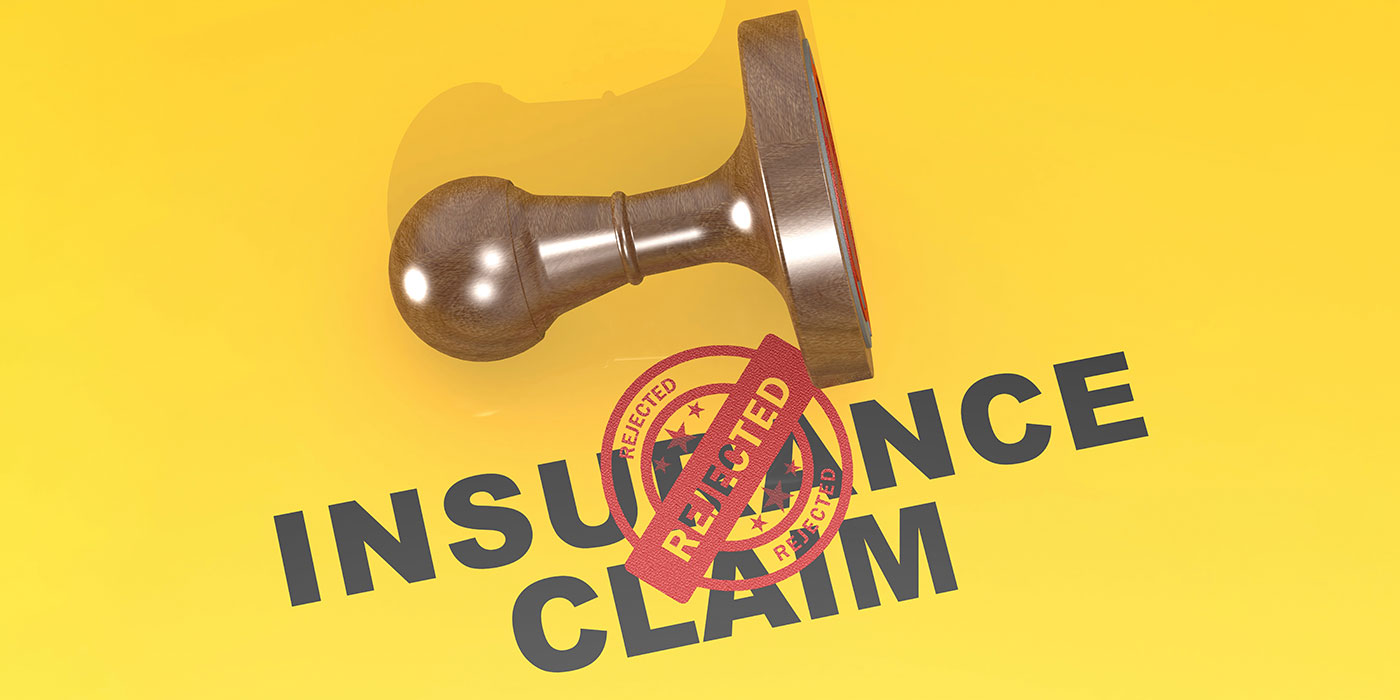“Should a collision shop rely on being a DRP shop to make a living? It seems to me that if you’re not a DRP shop, you’ll have very little business. The insurance company calls the shots, making you sign contracts and give them discounts. Is this fair?” – Dave Dunning, vice president of fixed operations, Dorschel Collision Center, Rochester, N.Y.

The question of “should a shop rely on being a DRP shop to make a living” is very easy for me to answer:
No!
In fact, in my opinion, a shop should never rely on a single source to make a living. All too often, a new owner, manager or supervisor will have a reason to favor someone else, and your shop can be left out in the cold – even after years of depending on that one source to make a living. You can have a wonderful working relationship for years, but it can disappear overnight due to many reasons, such as personality differences and economic pressures. An agreement that worked well for your shop for many years can also turn sour when someone on the other side decides to change the agreement or the rules you’ve been accustomed to.
The same applies to many other sources of business, not just a DRP agreement. If you depend on one company or customer to make your living, you’re exposing your shop to potentially dangerous future problems. For example, if you do a majority of your work for one car dealer, fleet or company, what happens if that agreement goes sour? You’re left with no business. One large account with a company that ends up going out of business or filing for bankruptcy will instantly affect your business and your security. I know – I speak from experience. We had a local dealer go out of business and had the unpleasant task of getting our final payment for work completed. I now have a rule to limit any agreement we have to 20 percent of my total business. That’s not always possible and the percentage may be a bit higher or lower, but we never put all our eggs in one basket.
Am I on any DRPs? Yes.
I ran my shop for about 26 years without being on any DRP program. My wife, Judi, and my general manager and office manager prompted me to look into several programs mainly to get vehicles in and out faster, avoid lienholders’ names on checks and prompt smoother flow of work in the shop. I found that most of what I’d heard about DRP programs wasn’t true, and that none of the programs I looked at required discounts or usage of aftermarket sheet metal parts. Most of the anti-DRP voices in our industry aren’t on any programs and see DRPs as a problem. I haven’t found that to be true of two of the three programs we looked at. We did discontinue one program when the company tried to change the rules on us – so I chose not to participate. (More on that later.)
Regardless, we don’t depend on any one source for our living, and neither should you.
Decide for Yourself
DRP agreements are a constant source of disagreement between shops who favor such arrangements and those who are adamantly opposed to the principle of DRP anything. I think that, all too often, many people forget why the insurance industry exists or the fact that they, like us, are in business to make a profit. Like it or not, if an insurance company finds that making and keeping a direct relationship with collision shops benefits them, then they’re likely to do so. Likewise, if a shop owner finds that a DRP agreement is beneficial, he’ll participate.
What’s unfortunate is all the misinformation being circulated about DRP programs and those who blame DRP programs for all the collision industry’s problems. Don’t misunderstand me. There are horror stories about some DRP agreements and the insurance companies that run them that are very true. And there are some equally horrible stories about some shops on those programs that abuse or turn out poor repairs.
My thinking is simple: Bad repairs are bad repairs, and no shop should blame any insurance company for its lack of quality repairs. If a DRP agreement won’t work for your business, then don’t be a part of it.
When an insurance company changes the rules of an agreement and you don’t feel it’s in your best interest to participate, drop the program. You can’t because you depend on that agreement to pay your bills or because you have a lot of debt? Then you’re only prolonging the problem. Let’s face it. If you’re vulnerable and willing to do whatever you’re told in order to stay on a program, then you’re in trouble.
Don’t Join a DRP for the Wrong Reasons
Debt is the No. 1 reason I’ve seen shops get into trouble. A shop can grow slowly over the years, buy most of its equipment on an installment plan, mismanage finances and borrow money from banks – until more and more work is needed to generate enough money to pay the bills every month. At that point, many shops try to get on DRPs, hoping they’ll be a source of more work or thinking that being on them will solve their cash-flow problems.
Some insurers use a shop’s debt to their advantage by changing the rules of a DRP agreement, reasoning that the shop can’t service its debt without the insurer’s continued business. In fact, an insurance company supervisor told me exactly that. And, to my surprise, after a radical change of the program, the majority of shops took the revised program. Their debt forced them to take whatever they could get; they needed the cash flow to survive. The shops that continued on the program had 40 percent or more of their monthly income being generated from that one insurance company. That’s what debt can do to you.
I urge you to get out of debt and to buy when you can afford to buy. Don’t mortgage your future. It may take longer and it’s harder, but a shop with no debt will survive when many others fold.
Again, I speak from experience on this matter because my shop dropped a revised DRP program – and it surprised the supervisor that we could make that decision so easily. We knew our numbers, and we knew what we could and couldn’t do. It was simple, and strictly business, when my staff and I made that decision. We’d been on that program for a couple of years without problems, but then they changed the rules. We chose to no longer participate, and it didn’t hurt us because the percentage of business from that one company was well within acceptable limits. I pity those who couldn’t or wouldn’t make the same decision, but I understand their reasons. Debt can ruin you far faster than any DRP or other business agreement.

Who’s Really Your Customer?
I won’t tell anyone to be or not be a DRP shop for any company. I see advantages to some programs and none with others. Some programs make the repair process smoother and faster for the customer. Make no mistake: The insurance industry is not my customer. But if I can get a car or truck in faster, get to work on it that day and make my customer happy, then I’ll consider a program.
I don’t give labor or parts discounts, I don’t use aftermarket sheet metal and I believe any customer should be able to choose any shop he desires to repair his vehicle and not be steered or directed to a shop because of a DRP agreement. I never want to repair a customer car that the customer does not want repaired here – ever! I also won’t repair a vehicle that my shop deems not repairable, regardless of what anyone else thinks. I know where profit is made in this business and the dollar range that’s most profitable for my shop. I don’t have a perfect shop and we make mistakes like anyone else, but we never stop trying to get every job done right.
I’ve sat and listened to numerous people in this industry slam any DRP program only to find out later that the people doing the slamming have never been on a DRP program or spent any time talking to anyone on a program. I think that’s wrong. There are programs that will work well for some shops and customers, and at the same time, there are programs that I consider totally unacceptable. If a DRP program will reduce claims costs for an insurance company and result in happy customers, then why wouldn’t they consider it? If a shop owner can work within a program and maintain a profitable and quality business and have happy customers, then why shouldn’t he consider it? It’s called freedom of choice, free enterprise and doing what works for you.
Don’t base your decisions solely on what you hear or read or what someone else tells you. Base your decisions on solid business principles, and never depend on anyone or on any one source for your business income.
Contributing Editor Bobby Johnson and his wife, Judi, own B&J Collision, Inc. in Jefferson, Texas. Bobby has been involved in many areas of this industry for more than 26 years and was BodyShop Business’ 1989 Collision Repair Shop Executive of the Year.













